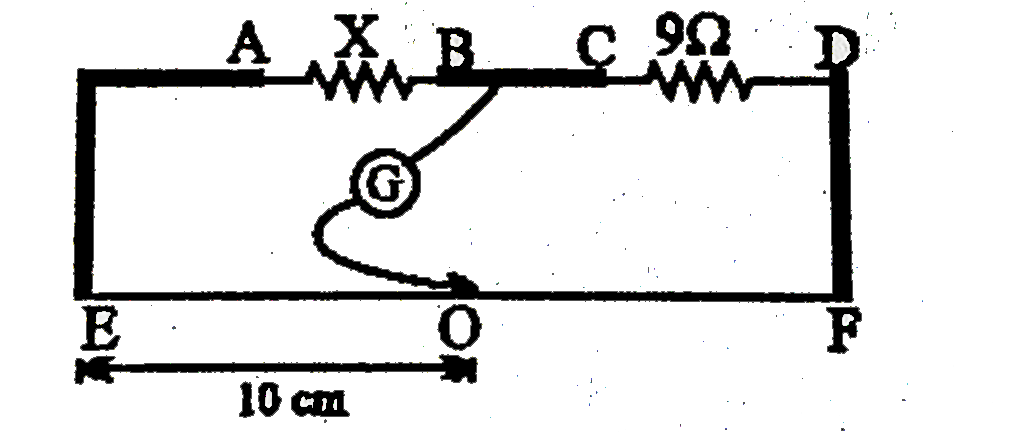
Consider the MB shown in the diagram, let the resistance X have temperature coefficient α1 and the resistance from the RB have the temperature coefficient α2. Let the reading of the meter scale be 10 cm from the LHS. if the temperature of the two resistance increase by small temperature ΔT then what is the shift in the position of the null point ? Neglect all the other changes in the bridge due to temperature rise.
9(α1−α2)ΔT
9(α1+α2)ΔT
1/9(α1+α2)ΔT
1/9(α1−α2)ΔT
The correct Answer is:A
X10=9090⇒X=10Ω
⇒10(1+α1ΔT)10+Δl=90(1+α2ΔT)90−Δl
⇒(1+α1ΔT)(1+Δl10)−1=(1+α2ΔT)(1−Δl90)
⇒(1+α1ΔT)(1−ΔT10)=(1+α2ΔT)(1+Δl90)
⇒1+α1ΔT−Δl10=1+α2ΔT+Δl90
⇒(α1−α2)ΔT=Δl9⇒Δl=9(α1−α2)ΔT
Topper's Solved these Questions
- BOOK - ALLENCHAPTER - ERROR AND MEASUREMENTEXERCISE - Part-2(Exercise-2)(A)16videos
ERROR AND MEASUREMENT
- BOOK - ALLENCHAPTER - ERROR AND MEASUREMENTEXERCISE - Part-2(Exercise-2)(B)22videos
ERROR AND MEASUREMENT
- BOOK - ALLENCHAPTER - ERROR AND MEASUREMENTEXERCISE - Part-2(Exercise-2)(B)22videos
ERROR AND MEASUREMENT
- BOOK - ALLENCHAPTER - ELASTICITY, SURFACE TENSION AND FLUID MECHANICSEXERCISE - Exercise 5 B (Integer Type Questions)3videos
ELASTICITY, SURFACE TENSION AND FLUID MECHANICS
- BOOK - ALLENCHAPTER - KINEMATICSEXERCISE - Integer Type Question3videos
KINEMATICS
Similar Questions
Knowledge Check
- Question 1 - Select One
The positive temperature coefficient of resistance is for
ACarbonBGermaniumCCopperDAn electrolyte - Question 2 - Select One
The solids which have negative temperature coefficient of resistance are:
AInsulators onlyBSemiconductors onlyCInsulators and semiconductorsDMetals - Question 3 - Select One
The temperature coefficient of resistance of a semiconductor
AIs always positiveBIs always negativeCIs zeroDMay be positive or negative or zero
The temperature coefficient of resistance of a conductor is
View SolutionThe temperature coefficient of resistance of a semi conductor is
View SolutionConsider the meter bridge shown in the figure below

The resistance X has temperature coefficent α1 and known resistance box [9Ω shown] has α2. For shown situation balance point is at 10cm from left end, if temperature of system increases by ΔT due to joule heating, then the shift in the balance point is (Assume that only the resistance of X and resistance box changes
due to change in temperature and there is no other effect).View SolutionTemperature coefficient of resistance α and resistivity ρ of a potentiometer wire must be
View SolutionThe temperature coefficient of resistivity of a semiconductor is
View Solution

